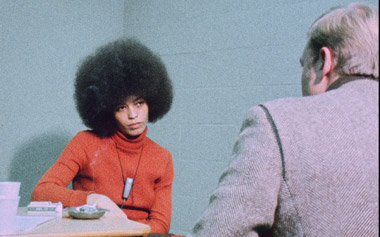All the hubbub down on Wall Street lately has been a welcome reminder of our American penchant for protest and activism, our calls for revolutions both large and small. In an era that is probably as divided a time as most of us can remember, it’s a comfort—even if it doesn’t always seem like much—to remember what a gift our right to protest can be. We might not always get what we want, but we can always be heard if we talk loudly enough.
That sense of a revolution “by the people” is front and center in The Black Power Mixtape, a new film from director Goran Olsson (Am I Black Enough For You) now screening at Amherst Cinema. Combining archival footage and modern-day interviews with leading African-American musicians, activists, and scholars, the film charts the course of the American Black Power movement that flared to life in the late 1960s, born of a frustration with the seeming slowness of the nonviolent forms of resistance promoted by Martin Luther King, Jr.
Though the movement sprang to life around the charismatic and militant Stokely Carmichael (seen here in another, softer light as he questions his mother about the circumstances of her poverty), the footage contained in the documentary comes from an unlikely source: Sweden. It turns out that Swedish television crews visited the United States at the height of the movement, intent on chronicling our racial divide; the resulting 16mm films have since sat in a Swedish archive, waiting to be rediscovered. Today, edited and reassembled by Olsson, they offer a remarkable look at our politics as seen from the outside.
It is, almost inevitably, something of a patchwork; while the film follows a fairly straightforward timeline, the disparate interviews create more of a mosaic than a painting, with each encounter an isolated piece of a larger work. Still, it is a rare chance to see some of the era’s noted names on film: Eldridge Cleaver, Huey P. Newton, and Angela Davis, among others, all make appearances. Davis, still teaching today, offers particularly affecting commentary on growing up in racist Birmingham, recalling the horrific 1963 church bombing that ignited a revolution.
A fascinating and enlightening look at the politics that have helped shape where we stand today, Black Power Mixtape makes one hope that there is some foreign news crew patrolling our highways now, so that in 40 years we can look back and make better sense of it all.
*
Also this week: Special screenings abound at area theaters, starting with Friday’s midnight show of Clueless, unreeling at Pleasant Street Theater. Directed by Amy Heckerling (Fast Times at Ridgemont High), this updated version of Jane Austen’s 1816 novel Emma stars Alicia Silverstone as Cher, a scheming rich girl in a Beverly Hills high school. Kate Singer, professor of Romanticism at Mount Holyoke College, will give a brief talk on how the film compares to the novel. On Saturday evening, the LGBT film series Out! For Reel presents Codependent Lesbian Space Alien Seeks Same at the Academy of Music. A mashup spoof that brings together lesbian romance and ’50s-era sci-fi, it follows three “lesbian space aliens” on an interstellar journey to Manhattan, where they must find romance to save their planet.
After taking Sunday off, we return to Amherst for a Monday evening showing of The Fly, David Cronenberg’s 1986 remake of the Vincent Price classic about a scientist whose experiment goes terribly wrong. Presented as part of the Science On Screen series, the film will be accompanied by a talk by Dr. Amie McClellan of Bennington College. A cell biologist, she will discuss the phenomenon of shared genetic code—or how we may not be so different from flies after all.
Finally, Tuesday night brings Pleasant Street’s Seeing Sound series. This new series celebrating American music in film gets underway with Blank City, director Celine Danhier’s documentary about the downtown scene in late 1970s New York. Sonic Youth’s Thurston Moore introduces the film.
Jack Brown can be reached at cinemadope@gmail.com.



